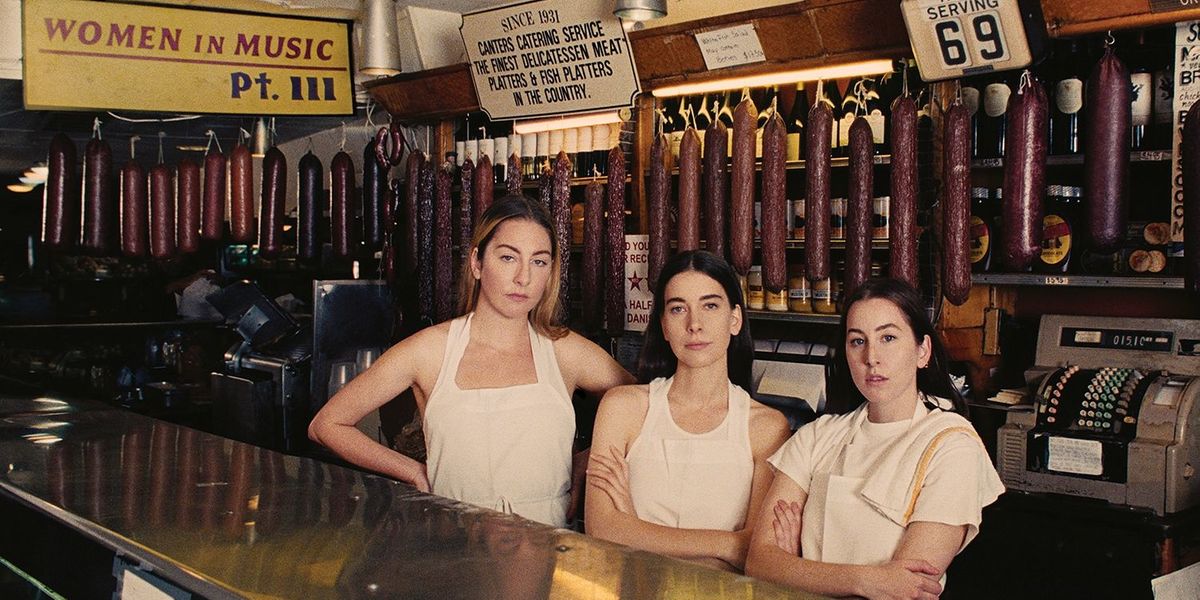“Give me a miracle, I just want out from this / I’ve done my share of helping with your defense,” HAIM sing on “Los Angeles”, the opener to their third studio album, Women in Music Pt. III. At this point, we’re used to the band’s tendency to shift between multiple different genres—sometimes in the same song—ranging anywhere from soft rock to pop-rock, to experimental synthpop. But this time around, something’s different. The group’s easy, breezy summer afternoon melodies are still there, but they’ve lost a lot of the gimmicks. In their place, we are treated to a brand new dose of vulnerable lyrics and refined production, which makes Women in Music Pt. III immediately feel like something that is intimately and uniquely theirs.
“There was a lot of stuff that, collectively, we weren’t dealing with head-on,” said Este Haim in the band’s recent profile for Vulture. “A lot of the shit that we were going through since 2012. When we came back from tour, it hit us all, collectively, at the same time.” For instance, Alana Haim had never properly grieved a close friend that she had lost in a car accident right before the promotional period for their first album Days Are Gone began. Este was told by her doctors that she might need to change careers, as touring was having devastating effects on her body as a result of her Type 1 diabetes. As for Danielle Haim, she had descended into a deep depression; one that was characterized by her sisters and bandmates as robbing her of her energy source and the life behind her eyes. The result of these personal traumas was HAIM writing their way through it, resulting in the first three singles “Summer Girl,” “Now I’m In It,” and “Hallelujah”—all released last year, before the world flipped upside down.
The group’s third LP was initially projected for a winter release, but the singers ultimately decided that their new music, much like that of their previous material, has a quality to it that most of us associate with summer. They settled on an April release, but then COVID-19 happened. “The label sent us something like, ‘Hey, can you post about this? Something promoting [the album].’ And it felt so fucking wrong,” Danielle said. “Like, I don’t want to promote anything right now.” The latest HAIM album was ultimately postponed until August, but then the sisters decided that there’s no time like the present. “The album itself was made with this feeling of like, ‘Let’s just put shit on tape, so let’s just roll with it,'” continued Danielle. So they decided to capture their feelings in a jar of sunlight and release Women in Music Pt. III, named after a dreaded question the singers constantly receive asking what it feels like to be “women in music”.
Women in Music Pt. III is just as eclectic in sound as Days Are Gone or Something to Tell You, but this time around the group feels more confident in their delivery as if they are symbolically letting us know that this is their moment. The vulnerable and confessional lyrics aid this growth and transition, reminiscent of Maggie Rogers’ Heard It in a Past Life. Still, the real growth on the record is that their “experimental” sounds don’t sound very, well, experimental anymore—they sound distinctly and authentically HAIM, which is not something that their previous material fully possessed.
The band’s penchant for inserting random noises in their songs, such as a gasp or even a fax machine, was never revolutionary (considering Billie Eilish has since made an entire industry out of it), but it was strange and a bit off-putting at times. Perhaps Women in Music Pt. III‘s biggest strength, aside from the vulnerability, is that all of the songs don’t sound the same—something that cannot be said for Days Are Gone or Something to Tell You. In other words, HAIM are done pretending to be other people and ready to be themselves.
The shift is evidenced most by the group’s choice to downgrade all three singles from last year to bonus tracks (including the synth-driven “Now I’m in It”, which now sounds so out of place) and emphasize the album’s other tracks, which are undoubtedly more interesting. “If I go right and you go left / Hey, I know we’ll meet up again,” they sing on the bridge to “The Steps”, a mellow, confessional love song. “And if you go left and I go right / Hey, maybe that’s just life sometimes.” On “Gasoline”, they’re pleading to get out from under—whether it’s from a romance or the toxic relationship we sometimes have with ourselves is left up to the imagination. “Gasoline, pretty please / I want to get off / But you’re such a tease / Throw the keys back to me / Go on and kick off your boots / In the passenger seat.”


